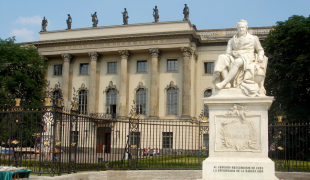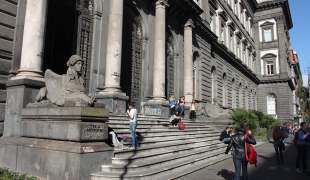Erasmus+

Stories from Our Participants

Prof. David Fortus, PI, Dep. of Science Teaching
The Erasmus+ program provided me with an excellent opportunity to visit colleagues at Humboldt University in Berlin and strengthen my connections with them. Two PhD students from there spent 3 months visiting Weizmann and working in my research group, and a PI from there also spent a short time at Weizmann, so I was looking for a chance to learn more about the work being done there and to investigate whether it made sense to consider joint projects. My time at Humboldt was divided between meeting with several PIs and their students, working on a research proposal, providing feedback on a poster gallery walk, giving a seminar, and just hanging out together. In summary, it was an excellent experience!

Katharina Knab, visiting student
I enjoyed my stay in the Steffen Jung Lab very much! The assistance in all organization matters before and during my stay abroad was great, e.g. with my visa, the Erasmus+ scholarship, and student housing on the campus. The application process for Erasmus+ was well organized, and both my German university and the International Office at Weizmann were very supportive and helped me with all forms. Thanks to this encouragement, I already felt in good hands before my arrival. The Weizmann Institute of Science is one of the world's leading research institutions. I was lucky to attend several guest talks from internationally renowned speakers and even participate in mini-symposia. Such events have always been a great opportunity to meet new people from the field and exchange thoughts. During my daily work in the lab, I was able to extend my scientific knowledge and gain hands-on experience. I received all the trust and support to even start my own project. I really appreciate this cooperative environment! Altogether, my stay abroad helped me to build an international network, to grow personally, and to expand my scientific skills.

Dr. Yael Feldman-Maggor, Postdoc, Dep. of Science Teaching
During May 2023, I had the privilege of participating in the Erasmus+ Mobility Staff program, which allowed me to visit Humboldt University in Berlin. The primary purpose of my visit was to engage with the chemistry education group at Humboldt University, where I had the opportunity to exchange knowledge, gather new ideas, and deliver a seminar and workshop. Additionally, I had the chance to get to know two biology education groups, one from Humboldt University and another at Freie University. Throughout the week, I had fruitful interactions with various researchers, including professors and graduate students, and gained valuable insights into Germany's education system. This visit also paved the way for potential future collaborations. As a post-doctoral fellow, I am grateful to the Erasmus+ Mobility Staff team at the Weizmann Institute and Humboldt University for facilitating this research visit. I eagerly look forward to participating in more Erasmus+ programs in the future.

Dr. Amit Finkler, PI, Dep. of Chemical & Biological Physics
The Erasmus+ program allowed me to not only strengthen my collaboration with my European partner but also to experience a teaching and working environment quite unlike the one in my home institution. This "change of atmosphere" is healthy from time to time and allows you to appreciate the differences in culture and mentality so that your own group dynamics at the end benefit greatly from it. A reciprocal visit in our home institution from my collaborator's group enabled "shadow working" and beautifully complemented the visit in the host university. In addition, the welcome package I received when arriving at the host university was without a doubt informative (with maps and brochures) and generous (with chocolate!). We will definitely try to repeat this next year and hopefully, every year as long as there is a signed agreement between the host and home universities.

Suher Masri, MSc Student, Dep. Science Teaching
At 50, I embarked on a transformative two-and-a-half-month journey through the Erasmus+ program at the University of Bonn as part of my master’s in science education at the Feinberg Graduate School, Weizmann Institute. With support from my professors and the ERASMUS office, the transition to Germany was seamless.
At Bonn, I was impressed by the organized structure, innovative curriculum, and exposure to advanced technologies and teaching methodologies, which enhanced my skills. Beyond academics, immersing in a different scientific culture and connecting with diverse individuals enriched my worldview and personal growth.
The Erasmus+ program was an invaluable academic and cultural experience, and I highly recommend it to anyone seeking to broaden their horizons.

Dr. Alexander Vaskevich, Dep. of Molecular Chemistry & Materials Science
I discovered the Erasmus+ program while searching for a way to initiate scientific collaboration with Prof. Patrik Schmuki at the University of Erlangen-Nuremberg. The program is well-organized and has minimal bureaucracy, which encourages collaborative work. I thoroughly enjoyed my time in the laboratory in Erlangen, both from a scientific perspective and on a personal level. It allowed me to start smoothly a new experimental direction of research. Furthermore, the scientific exchange was very productive, and we have already published a paper based on the results obtained during my visit. I hope to continue using the program for future collaborative work.
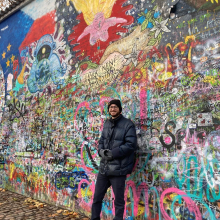
Dr. Alex Pottash, Postdoc, Dep. of Earth and Planetary Sciences
I spent one month at Charles University in Prague, working with a highly talented group led by Dr. Jiri Zahradnik. The research took place on the BIOCEV campus in Vestec, which had all the equipment and facilities I needed. During that time, I learned new techniques and worked collaboratively to develop cutting-edge technologies for discovering protein binders de novo. Outside of research, Prague and the Czech Republic are beautiful, vibrant places with fascinating history and welcoming people. The city is endlessly explorable. I am grateful to my hosts for an experience I will never forget! I hope to participate in an Erasmus program again in the future.

Prof. Ron Blonder, PI, Dep. of science Teaching
Engaging in the ERASMUS+ programs has been a profoundly impactful professional experience. It has allowed me to connect with researchers from various European institutions, fostering the creation of innovative projects and collaborations. These projects have not only advanced my research but also significantly benefited the students in my research group. Through seminars organized by the ERASMUS+ programs, my students had the opportunity to meet esteemed scientists, which led to postdoctoral positions and support for conference travel.

Dr. Inbal Riven, Dep. of Chemical and Biological Physics
Our recent visit to Dr. Axel Mogk’s lab at Heidelberg University was a pivotal moment in our ongoing collaboration on ClpC regulation. Thanks to the generous support of the Erasmus program, we were able to spend valuable time in person with our colleagues—an opportunity for which we are deeply grateful. Unlike virtual meetings, the face-to-face exchange allowed us to work side-by-side at the bench, fostering direct, hands-on discussions of experimental design and interpretation. Meeting the students actively driving the project, sharing real-time protocols, and troubleshooting together accelerated our mutual understanding and deepened scientific engagement. Just as important were the informal conversations over coffee and shared meals, which built trust, sparked new ideas, and strengthened the collaborative spirit. These in-person interactions, which cannot be replicated over Zoom, greatly enriched both the scientific and human dimensions of the project. We sincerely thank the Erasmus program for making this visit possible and look forward to continuing this dynamic and fruitful collaboration.

Sharon Diamant-Pick, Diversity and Inclusion Office
I have just returned from an inspiring Erasmus+ International Staff Week at FAU Erlangen-Nürnberg, dedicated to Diversity & Inclusion in higher education.
The program brought together 34 colleagues from Europe, New Zealand, and Australia - an incredibly diverse and thoughtful group that quickly became a vibrant learning community.
In these complex times - especially for us in Israel - it was a true privilege to be part of a group grounded in solidarity, openness, and shared purpose. Through our differences, we found deep mutual learning and connection. We explored inclusive teaching, systemic change, and the power of identity and language. Most of all, I return with new ideas, meaningful connections, and a renewed sense that our work matters—locally and globally. This opportunity was made possible by Erasmus+, a powerful platform for building bridges in academia and beyond.
Our partners:
Links below to their websites, or download the PDF here
Travel Costs: Between €300 - €500
Monthly Stipend: Between €650 - €850
Timeframe: 2–12 months for studies and/or traineeships
Notes: Some institutions allow a combination of short-term physical mobility and a virtual component.
Travel Costs: Between €300 - €500
Daily Grant: Between €120 - €160
Timeframe: Teaching or training stays of 1 week to 2 months
Travel Costs: Between €300 - €500
Monthly Stipend: Enquire if relevant
Daily Grant: Between €120 - €160 (up to 1 month)
Timeframe: Teaching or training stays of 7 days to 3 months
Travel Costs: Between €300 - €500
Daily Grant: Between €120 - €160
Timeframe: Up to 7 days
The Weizmann Institute students can study/train abroad from 2 to 12 months. PhD and recent-graduate* students are eligible for short-term mobilities of 5-30 days.
Send the following to erasmus@weizmann.ac.il in English, stating where you wish to visit, from when and until when:
1. Curriculum Vitae
2. Academic Transcripts
3. A Letter of Motivation. In your letter, discuss why you chose the institution where you wish to study, highlighting how its curriculum aligns with your current and future academic pursuits as outlined in your application, including language study, multiculturalism, and other specified courses.
4. The PI's written recommendation
The relevant WSoS Board of Studies will evaluate all applications and inform you of its decision.
* Recent graduates may participate in mobility for traineeship. They must be nominated during their last year of study and must carry out and complete their traineeship abroad within one year of obtaining their graduation.
The Weizmann Institute academic staff, including Staff Scientists and Postdocs, can train abroad from 1 week to 2 months.
- Email Yaara Biess, the Erasmus coordinator at the IO, and state where you wish to visit from when until when.
- Attach a Letter of Invitation from the Host at the Partner University
- Staff Scientists and Postdocs must attach the supervisor's approval and recommendation letter.
- The Academic Staff applications will be reviewed and approved by the Academic Affairs Office, and the Board of Postdoctoral Training will review Postdoctoral applications.
The Weizmann Institute administrative staff, including Research Associates, can train abroad from 1 week to 2 months. Some partners offered organized staff weeks for particular job functions (One week = five working days +2 days of travel).
Search for a suitable week-long program offered by one of our partners on the list below at http://staffmobility.eu/staff-week-search or,
Contact a colleague from a partner University and propose cooperation.
Receive initial approval from the host university and plan your mobility program.
Complete the WIS HR Internal request form and upload the following:
1. Recommendation letter from your supervisor.
2. Your CV (in English)
3. Letter of motivation and description of the mobility plan, including estimation of expenses reimbursed by the Erasmus+ funds.
Applications must be COMPLETED at least four weeks before planned mobility (please check the relevant date with Yaara Biess, the Erasmus coordinator at the IO).
An HR committee evaluates all applications and will inform you about their decision.
More Information you may need
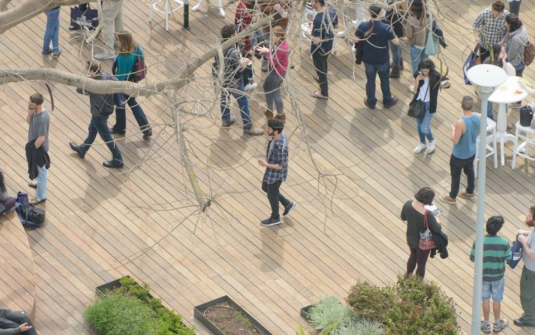
Life on Campus
The Weizmann Institute of Science is a leading international multidisciplinary research institution.
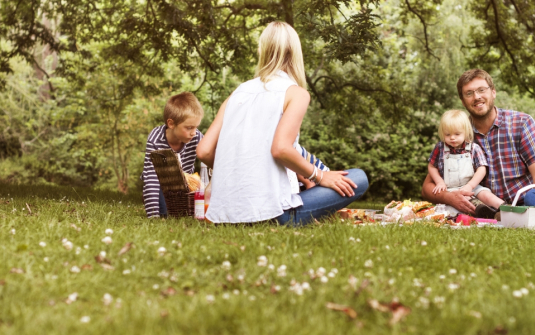
Family Life
If you are arriving with children, you will want to know what educational opportunities are available for them in Rehovot. Children normally attend the kindergarten or elementary school in their neighborhoods, while older children may travel by bus to their middle or high schools.



